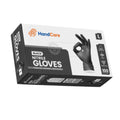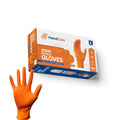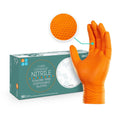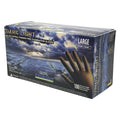When working with oils, fuels, and other slick substances, you need gloves that maintain their grip and dexterity. Ordinary gloves can quickly become saturated and slippery, compromising both safety and performance.
That's where oil-resistant gloves come into play. Specially designed to repel oils while providing reliable grip, these gloves are a must-have for mechanics, manufacturing workers, and anyone frequently handling greasy materials.
In this guide, we'll explore what makes a glove oil-resistant, the various types available, and how to choose the best pair for your needs.
What are Oil Resistant Gloves?
Oil-resistant gloves are specially designed hand protection that repels oil, grease, and similar substances. They prevent these slick liquids from penetrating the glove material and reaching your skin. Oil-resistant gloves help maintain grip and dexterity, keeping your hands safe and productive in oily environments.
These gloves are commonly made from synthetic rubber materials like nitrile, PVC, or neoprene. The material is treated or formulated to create a barrier against oil while offering a reliable grip surface. Some oil-resistant gloves also feature textured palms or fingertips to further enhance grip in slippery conditions.
4 Best Oil Resistant Gloves for Your Needs in 2025
When selecting the best oil-resistant gloves for your specific requirements, consider factors such as the glove material, thickness, grip pattern, and overall durability. Nitrile gloves are a popular choice for their excellent resistance to oils, fuels, and chemicals, while providing a snug fit and good dexterity. PVC gloves offer durability and resistance to oils, greases, and chemicals, making them suitable for industrial settings.
The thickness of the gloves, measured in mils, impacts their durability and level of protection. Thicker gloves, around 6-8 mils, provide better puncture and abrasion resistance, while thinner gloves, around 4-5 mils, offer improved tactile sensitivity.
1. HandCare Black Nitrile Gloves (6 Mil)
These HandCare Black Nitrile Gloves combine durability with precision, making them a trusted choice for professionals across various industries.
The 6-mil thickness ensures protection against punctures and abrasions while maintaining a comfortable and snug fit for extended use. Powder-free and latex-free, they are suitable for individuals with sensitive skin or latex allergies. With a smooth finish and textured fingertips, these gloves offer enhanced grip for delicate or precise tasks.
👉 Shop HandCare Black Nitrile Gloves 6 Mil and save up to 50% now
Whether in healthcare, automotive maintenance, or food handling, these gloves provide the reliability and performance users need in demanding environments.
• Uses: Ideal for handling chemicals, oils, cleaning tasks, or medical examinations. Their versatility also makes them perfect for food service and light industrial applications.
• Industries: Healthcare, automotive, janitorial, food preparation, and industrial maintenance.
• Thickness: 6 mil.
2. HandCare Orange Nitrile Gloves (8 Mil)
The HandCare Orange Nitrile Gloves are designed for professionals who demand durability, visibility, and unmatched performance. The bright orange color is ideal for high-visibility tasks, ensuring safety in low-light or high-risk environments.
With an 8-mil thickness, these gloves provide superior resistance to chemicals, oils, and punctures, making them a dependable option for heavy-duty applications. The textured grip adds control and precision, ensuring users can work confidently even with slippery materials.
👉 Shop HandCare Orange Nitrile Gloves 8 Mil and save up to 50% now
These gloves balance strength and flexibility, making them a staple for demanding industries.
• Uses: Perfect for automotive repair, chemical handling, and industrial maintenance, where strong protection and visibility are essential.
• Industries: Automotive, industrial maintenance, chemical handling, and laboratories.
• Thickness: 8 mil.
3. ASAP T-Grip Orange Nitrile Gloves (7 Mil)
The ASAP T-Grip Orange Nitrile Gloves offer the perfect combination of protection and precision. Their 7-mil thickness provides robust resistance to punctures, oils, and chemicals while maintaining a level of dexterity required for detail-oriented work.
The textured surface enhances grip, making them ideal for tasks requiring precision, even in wet or oily conditions. The powder-free design ensures skin safety, and the bright orange color boosts visibility, reducing the risk of accidents in busy or dimly lit environments.
👉 Shop ASAP T-Grip Orange Nitrile Gloves 7 Mil and save up to 50% now
These gloves are a favorite for professionals who need confidence and control in their protective wear.
• Uses: Suitable for automotive tasks, chemical handling, and industrial maintenance, offering secure handling in greasy or hazardous conditions.
• Industries: Automotive, industrial maintenance, chemical processing, and manufacturing.
• Thickness: 7 mil.
4. Dark Light Black Nitrile Gloves (9 Mil)
For maximum durability and protection, Dark Light Black Nitrile Gloves are the go-to option for heavy-duty tasks. With an impressive 9-mil thickness, they provide exceptional resistance to punctures, tears, and chemicals, making them indispensable for handling the toughest jobs.
These gloves are powder-free and latex-free, ensuring comfort for extended use without irritation or allergic reactions. The heavy-duty construction is complemented by a textured surface, offering a firm grip for handling tools, equipment, or hazardous substances.
👉 Shop Dark Light Black Nitrile Gloves 9 Mil and save up to 50% now
Designed for professionals who need the highest level of safety, these gloves instill confidence in their reliability.
• Uses: Designed for tasks involving hazardous materials, heavy machinery, and high-risk environments. Perfect for mechanics, emergency responders, and industrial workers.
• Industries: Automotive, industrial maintenance, hazardous material handling, emergency response, and chemical processing.
• Thickness: 9 mil.
Types of Oil Resistant Gloves
When it comes to choosing the best oil-resistant gloves for your needs, you have several options to consider. Each type offers unique advantages and is suited for different applications.
Disposable Nitrile Gloves
Disposable nitrile gloves are a popular choice for light-duty tasks involving oil exposure. These gloves are made from synthetic rubber and provide excellent resistance to petroleum-based substances. They offer a snug, comfortable fit and good dexterity, making them suitable for tasks requiring precision. Disposable nitrile gloves are a cost-effective option when frequent glove changes are necessary.
Reusable PVC or Neoprene Gloves
For more heavy-duty applications or prolonged exposure to oils, reusable gloves made from PVC or neoprene are a durable choice. These gloves are thicker and more robust than disposable options, offering better puncture and tear resistance. They stand up well to oils, greases, and many chemicals, making them suitable for industrial and manufacturing settings. Reusable PVC or neoprene gloves can be cleaned and used multiple times, providing a cost-effective solution for long-term use.
Mechanics-Style Gloves with Grip Coating
Mechanics-style gloves, often made from synthetic leather or fabric, are another option for working with oils. These gloves feature a palm coating, usually made from nitrile or PVC, that provides oil resistance and enhanced grip. The ultimate guide to selecting the best gloves for oil changes explores the key features to look for when choosing gloves for automotive work. Mechanics-style gloves offer good dexterity and are suitable for tasks that require a combination of oil resistance and tactile sensitivity.
Benefits of Using Oil Resistant Gloves
Oil-resistant gloves offer several key advantages that make them a valuable investment for anyone working with greasy or slippery substances.
Protection from Skin Irritation and Dermatitis
Prolonged exposure to oils, fuels, and lubricants can cause skin irritation and even lead to painful conditions like contact dermatitis. Oil-resistant gloves create a barrier between your skin and these substances, preventing direct contact and minimizing the risk of skin problems. This protection is especially important for those with sensitive skin or pre-existing conditions.
Enhanced Grip and Dexterity
One of the most significant benefits of oil-resistant gloves is their ability to maintain grip and dexterity in slippery conditions. The materials used in these gloves, such as nitrile or PVC, are designed to repel oils and provide a secure grip on greasy surfaces. This enhanced grip allows you to handle tools and equipment with confidence, reducing the risk of slips and drops. Many oil-resistant gloves also feature textured palms or fingertips to further improve grip.
Improved Safety in Slippery Conditions
Slippery hands can lead to accidents and injuries, especially when working with heavy machinery or dangerous tools. Oil-resistant gloves help mitigate these risks by providing a reliable grip and preventing oils from compromising your hold. With a secure grip, you can work more safely and efficiently, even in challenging conditions. This improved safety is particularly crucial in industries like automotive repair, manufacturing, and oil and gas, where slips can have serious consequences.
Prolonged Glove Life
Investing in quality oil-resistant gloves can save you money in the long run. These gloves are designed to withstand repeated exposure to oils and lubricants without breaking down or losing their protective properties. Unlike regular gloves that quickly become saturated and need frequent replacement, oil-resistant gloves can be used for extended periods, providing better value for your money. Look for gloves made from durable materials like nitrile or neoprene for the best longevity.
What Industries Rely on Oil Resistant Gloves?
Oil-resistant gloves are a staple in various industries where exposure to oils, greases, and lubricants is common. These gloves provide a barrier against slippery substances, ensuring safety and productivity in the workplace.
Automotive and Mechanics
The automotive industry heavily relies on oil-resistant gloves for tasks such as oil changes, engine repairs, and general maintenance. Mechanics need gloves that provide grip and dexterity while protecting their hands from harsh chemicals and fluids. Nitrile gloves are a popular choice for mechanics due to their durability, oil resistance, and comfortable fit.
Manufacturing
Manufacturing environments often involve handling greasy components, lubricants, and machinery. Oil-resistant gloves are necessary to maintain a secure grip on parts and tools, preventing slips and accidents. Workers in metal fabrication, assembly lines, and quality control benefit from the protection and performance of these gloves.
Food Processing
While it may not be the first industry that comes to mind, food processing often involves exposure to oils and fats. Oil-resistant gloves are used in commercial kitchens, meat processing plants, and food packaging facilities to maintain hygiene and prevent cross-contamination. These gloves provide a barrier against greasy substances while allowing for the necessary dexterity to handle food items.
Petrochemical
The petrochemical industry deals with a wide range of oil-based products, from crude oil to refined fuels and lubricants. Workers in refineries, pipelines, and storage facilities need gloves that can withstand prolonged exposure to these substances. Oil-resistant gloves made from materials like neoprene or PVC offer the necessary protection and chemical resistance to keep workers safe in these challenging environments.
Key Features to Look for in Oil Resistant Gloves
When shopping for the best oil-resistant gloves, there are several key features to consider. These factors impact the gloves' performance, durability, and suitability for your specific needs.
Glove Material and Thickness
The material and thickness of the gloves play a significant role in their oil resistance and overall protection. Common materials for oil-resistant gloves include:
- Nitrile: A synthetic rubber that offers excellent resistance to oils, fuels, and many chemicals. Nitrile gloves provide a snug fit and good dexterity.
- PVC: Polyvinyl chloride is durable and resistant to oils, greases, and chemicals. PVC gloves are often used in industrial settings.
- Neoprene: Another synthetic rubber that provides oil and chemical resistance. Neoprene gloves maintain flexibility in cold temperatures and offer good grip.
The thickness of the gloves is measured in mils (1 mil = 0.001 inch). Thicker gloves, such as those in the 6-8 mil range, provide better durability and protection against punctures and abrasions. However, they may sacrifice some dexterity. Thinner gloves, around 4-5 mils, offer better tactile sensitivity but may not be as durable.
Grip Pattern or Texture
Look for gloves with a textured or patterned grip on the palm and fingertips. This feature enhances grip on oily or slippery surfaces, reducing the risk of drops and slips. Common grip patterns include:
- Raised dots or diamonds
- Textured microfin...
How to Choose the Right Size and Fit
Selecting the correct glove size is important for ensuring optimal protection, comfort, and dexterity. Gloves that are too small can restrict movement and cause discomfort, while gloves that are too large may compromise your grip and allow debris to enter.
To find your glove size, measure the circumference of your dominant hand around the palm, excluding the thumb. Compare this measurement to the manufacturer's sizing chart to determine the appropriate size. Keep in mind that sizing may vary slightly between brands, so it's always best to consult the specific chart for the gloves you're considering.
When trying on gloves, pay attention to the fit and feel. The gloves should be snug but not tight, allowing for some stretch and flexibility. Make sure you can comfortably bend your fingers and grip objects without the gloves slipping or bunching. If you'll be wearing the gloves for extended periods, prioritize comfort and breathability to prevent hand fatigue.
If possible, test the gloves by performing tasks similar to those you'll be doing on the job. This will give you a better sense of the gloves' dexterity and whether they'll meet your needs. Some gloves may feel stiff initially but will break in and conform to your hands over time.
Choosing the right size and fit for your oil-resistant gloves will ensure they provide the necessary protection without compromising your comfort or productivity. Take the time to measure your hands and try on different options to find the best gloves for your specific requirements.
Where to Buy Best Oil Resistant Gloves
Investing in quality oil-resistant gloves protects your hands from potential skin irritation, enhances grip and dexterity in slippery conditions, improves overall safety, and can save you money in the long run due to their durability and longevity. High-quality gloves designed for your specific industry and tasks will provide the necessary barrier against oils, greases, and other slippery substances, allowing you to work confidently and efficiently.
gloves.com offers a wide range of high-quality oil-resistant gloves tailored to meet the specific needs of various industries. Their selection ensures you find the perfect fit for protection, grip, and durability when working with slippery substances.
Explore gloves.com today to find the right gloves for your job and enhance your safety and efficiency. Save up to 50% today!









